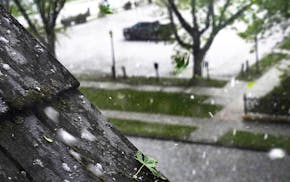As the young couple entered the restaurant, patrons stood. Polite clapping grew to boisterous applause. Strangers lined up, hoping to be introduced to Rick Sorenson, leaving the woman he would marry to wonder, "What in the world is this all about?"
"That's how I found out he had the Medal of Honor," Millie Sorenson said last week. "He'd never mentioned it before that."
Richard K. Sorenson is another illustrious alumnus of Anoka High School, which honored the first members of its new Hall of Fame last week. Sorenson is not in the group, but amid publicity around the event, his remarkable story resurfaced.
At age 17, Rick Sorenson tried to quit Anoka High School and enlist in the Navy the day after Pearl Harbor, but his parents refused to grant their permission. Two years later, as a Marine, he would earn his country's highest military honor by hurling his body atop a live grenade, risking his own life to save the five Marines with him.
The grenade tore through Sorenson's thighs and hips, forcing six operations and leaving life-long scars. He received the Medal of Honor in a military hospital, in front of other patients, doctors and nurses.
He never used the medal as a calling card.
Bob Thompson, 88, of Chaska, recalls returning to his hometown of Fargo, N.D., on furlough and meeting with family members at a tavern. Thompson was in uniform when a man quietly tapped him on the shoulder and said, "Hi, Marine. Nice to see you."
Thompson thought little of the gesture and the man walked away. Thompson's brother then said, "Do you know who that is? His name is Rick Sorenson. He has a Medal of Honor."
A special person
A humble, "gentle man," Sorenson "gave off the kind of aura that said this was a special person," said Vickie Wendel, program manager for the Anoka County Historical Society. "He never bragged. But sometimes you just know."
His fellow Marines could not have known what they would experience during a chaotic early morning in February 1944. Nineteen-year-old Pfc. Sorenson had been away from the States for all of 18 days when his unit was deployed to the atolls of Kwajalenin in the Marshall Islands. Sorenson was part of a machine-gun squad in an assault battalion on a small island that was defended by 4,000 Japanese soldiers firing from behind thick concrete fortresses.
Through the darkness of night, Sorenson and 35 other men took cover behind a Japanese building not knowing that the rest of the American troops had departed from the area.
At dawn, the Japanese attacked. Battle raged for 30 minutes, before a Japanese soldier inched close enough to toss a grenade.
When Sorenson heard a shout of "hand grenade" at 6 a.m., he knew he couldn't leap to the other side of the concrete foundation and abandon his troops.
"We had been trained over and over again to cover the grenade," Sorenson told the Minneapolis Tribune in 1949. "Cover the grenade! Don't let everybody get it just to save your own hide."
Years later, he told Wendel, "If I don't do this, it's going to hurt all these other guys around me. I have to protect them."
Two other local heros
It's an interesting detail that, of 27 Marines who threw themselves on grenades during World War II, three came from Anoka County. Pfc. Richard E. Kraus, of Spring Lake Park, was killed when he hurled himself on a Japanese grenade, saving three fellow Marines, in the Palau Islands in 1944. On March 8, 1945, at the battle of Iwo Jima, Pfc. James LaBelle, of Columbia Heights, gave up his own life to save others when he dove onto a grenade thrown outside his fox hole.
Sorenson, the lone survivor of the three local World War II Medal of Honor winners, was recalled to active duty during the Korean War and was commissioned a Marine Corps officer in 1953.
He spent years working for what was then the Veterans Administration and later became an insurance salesman. His family moved to California and then to Reno, Nev., where he died, at the age of 80, seven years ago.
There's a park in Anoka named for Sorenson, and a statue of him overlooks an Anoka cemetery.
He's buried at Fort Snelling National Cemetery. Millie Sorenson, who still lives in Reno, recently visited his grave.
"He never talked much about the war, not even through 56 years of marriage," she said. "Most of the Medal of Honor winners don't talk about it.
"Once a Marine, always a Marine. People can remember him any way they'd like. I think he just wanted to be remembered as a Marine."
Paul Levy • 612-673-4419

Why do so many Minnesota homeowners get free roofs after a hailstorm?
Minnesota state parks press on with camping reservation system tweaks

A plume of PFAS chemicals under the east metro is moving. The state has a new plan to stop it.

Andover High School teacher leads effort for more understandable driver's tests

